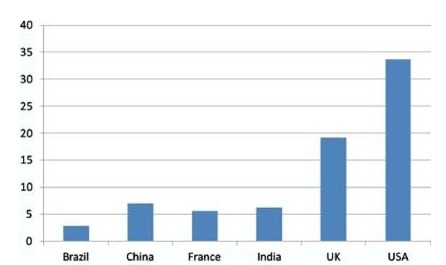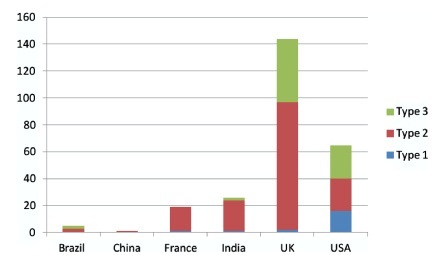One reason clean energy might face such a grinding struggle for policy support in the United States is the degree to which climate-change skepticism and denial is part of the discussion – a reality reflected in a new study that shows major U.S. media have been far more willing to include voices that deny the Earth’s climate is warming and oppose robust action to slow warming.
Consider the case of two of the most powerful media outlets in the country, the New York Times andWall Street Journal.

In a period from November 2009 to February 2010 that included “Climategate,” the Copenhagen summit, and various other controversies surrounding climate change, 34 percent of the newspapers’ articles on the broader topic “contained skeptical voices,” the study found, nearly double the rate (19 percent) in the next country, the United Kingdom, with China (7 percent), India and France (6 percent) and Brazil far back (3 percent).
The study, published in Environmental Research Letters, found that, oddly enough, left-leaning newspapers published slightly more articles that gave space to climate skeptics than right-leaning newspapers – suggesting politics aren’t a big factor.
But in fact, political differences did show up when the researchers looked at opinion pieces that were published.
In right-leaning newspapers (the Journal and, in the U.K., the Telegraph), opinion pieces containing skeptical voices were far more likely to go uncontested. For example: “The Wall Street Journal ran 17 opinion pieces, all but one of which was left uncontested,” the researchers said.
The researchers also found a difference in the type of skepticism seen in the U.S. and the other countries.

“The types of skeptics who question whether global temperatures are warming at all appear almost exclusively in the U.K. and U.S. newspapers,” the researchers said. “These two countries also give a very strong presence to the type of skeptic who challenges the need for robust action against climate change.”
Other newspapers chosen for analysis were Folha de São Paulo and Estado de São Paulo in Brazil; People’s Daily and Beijing Evening News in China; Le Monde and Le Figaro in France; The Hindu and Times of India in India; and the Guardian/Observer in the U.K.
The study noted that climate skepticism is “known to be prevalent” in Australia, Canada, Norway and Eastern Europe, and said further research into how newspaper coverage plays out there could be helpful in understanding the phenomenon.